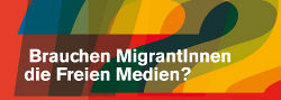Media Machine Interventions and Offensives by Immigrant Media Production
Societies and democratic systems in Europe are increasingly confronted by phenomena like disaffection from politics and citizens' feelings of political impotence and indifference in the face of hegemonic facts and circumstances and populist currents in political life.These are the consequences of a political and democratic discourse substantially shaped by economic interests within societies, and pursued by lobbyists, multinational corporations and professional experts.
This current development is described as a post-democratic society[1] that is based on the assumption that asserting the interests of a powerful few will lead to an erosion of democratic and political structures and thereby work to the economic advantage of this elite.
Among the ranks of civil society are numerous organized initiatives committed to opposing this trend. They are confronting particular issues within European society, and can be considered representatives of a process of critical reflection in current cultural, social, economic and artistic discourses.
Nevertheless, citizens are no longer perceived as political protagonists; instead, they are seen merely as interchangeable objects of such things as health, social welfare and employment statistics. Active participation in democratic processes by citizens is increasingly limited to filling out an election ballot every couple of years. Low voter turnout in European countries shows that it is becoming increasingly difficult for people to identify with an overall social project like a political party or an ideological program. Election platforms reflectusually in populist formonly those issues that appeal to a majority of the electorate.
The Grand Narratives are Over
Thus, the absence of *grand narratives* and the undermining of state structures seems to have plunged democracy and its political representatives into an ongoing process of decay, which is leading to a redefinition of (power) centers, peripheral areas, and mechanisms of exclusion and inclusion within European societies. Furthermore, a reproducing financial & capital system has established itself, one thatdespite all the crisespresents itself as the essential, defining feature of a functioning democracy.
This form of democracy is characterized by the increasingly important role played by experts, lobbies and the monopoly of knowledge and power this gives rise to. This means outsourcing political and democratic processes to institutionalized centers of power: financial markets and multinational corporations. The political decision-making process shifts away from democratic participation by citizens to management by a handful of experts. This generates a new type of exclusionary mechanism at work in the way decisions are made in a society.
On the other hand, we have witnessed since the end of the 20th century the emergence of a growing number of NGOs and initiatives, and stronger commitment on the part of activists representing civil society. These organizations see themselves as means of taking action on behalf of particular interests and persons affected by concrete political, ecological, social and economic problems. Their members have made a commitment to working as advocates.
Representation beyond Hired Experts
The dominance of hired experts and lobbyists in conjunction with political and democratic processes constitutes a severe problem for the representation of societys marginalized groups. This situation calls into question the role of experts as spokespersons on behalf of marginalized groups and what value should be attributed to these opinions.
How can marginalized groups as a whole be represented in a society that has ceded to experts tremendous power to define the terms of the discourse?[2] Can these groups be represented at all and who will be the ones to speak on their behalf? Which forms can this advocacy process assume and which mechanisms emerge thereby?
The Role of Self-organized and Participative Media in Times of Hired Experts
In Austria in the late 1990s, numerous media initiatives were set up to implement open access and media production beyond the commercial realm. This development was seen by many in immigrant communities in Austria as an opportunity to achieve a higher profile presence in the media and in political debates, which had been impossible prior to the founding of non-commercial radio providers.
However, in recent years, this successful empowerment project has been confronted by a consistently xenophobic and racist media landscape. Reporting in mainstream media on the subject of immigration seems to be increasingly oriented on the restrictive discursive patterns promoted by the political elites and these media very rarely propagate an active, critical way of looking at social situations and prevailing facts & circumstances. Which forms of intervention suggest themselves as ways for free media to respond to these developments, and are the channels currently being made available to the immigrant communities still adequate?
Discussion Forums and Public Discussion
At the Ars Electronica Festival, Radio FRO 105.0 MHz will confront fundamental issues connected with pervasive ongoing populism in the mass medias coverage of immigration. The primary focus will be on developments and changes within the free media scene in Austria and Europe. How can a participative and open media project position itself amidst a media landscape that constantly flirts with racism and nativism? Which forms of intervention in structures as well as in the public sphere are made available by free radio stations, and what might these achieve?
In two discussion forums and a panel discussion, protagonists and organizations will be linked up into a dynamic process, issues and problematic situations will be discussed, and possibilities of cooperation and networking will be created.
Text: Alexander Vojvoda
Translated from German by Mel Greenwald
[1] See Crouch, Colin Postdemokratie (2008)
[2] See Spivak, Gayatri Chakravotry Can the Subaltern Speak? (2008)
Zuletzt geändert am 22.08.11, 00:00 Uhr

Kommentare werden von der Redaktion moderiert. Es kann daher etwas dauern, bis dein Kommentar hier erscheint. Wir behalten uns vor, diskriminierende oder diffamierende Kommentare, sowie solche, die straf- oder zivilrechtliche Normen verletzen, zu entfernen.